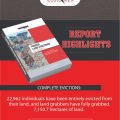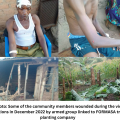By Witness Radio team.
Vivian Nandyose, a bright student, should have been in Senior Five this year. However, her dreams were shattered when her parents, the pillars of her education, were unjustly imprisoned over land-related criminal charges. With both parents in prison for eleven months, on what the family claims were false accusations, Vivian was forced to put her education on hold and take care of her five younger siblings.
In Uganda, Senior Four is the fourth and final year of lower secondary school, also known as the O-Level period. It’s the equivalent of grade 10 in the United States. Students in Senior Four take their O-Level exams, known as the Uganda Certificate of Education (UCE) at the end of the year.
“This is the life that we are experiencing because some greedy rich man caused my parents to be imprisoned. I didn’t go for senior four because I didn’t have school fees, and no one could care for the young ones while I was away,” Vivian painfully revealed in an interview with Witness Radio Uganda in December 2024.
The horrific arrest of her parents from their home in Kabubbu-Kabonge village, Nansana Municipality, Wakiso District, on January 10, 2024, is something that 17-year-old Vivian will never forget. At 1:00 a.m., police officers from the Luwero Police Station broke into their home. They took her parents, Mr. Ssebaggala Richard, his wife, Namande Prossy Kanabi, and their relative, Anania Ngabirano, into custody. The incident happened without prior notice of the reasons surrounding their arrest.
Vivian stated, “We have no peace; we can’t do anything now. Because the people who used to help us are no longer with us, I cannot afford to care for my younger siblings.”
The trio faces accusations of aggravated robbery related to a one-acre land dispute with businessman Benon Ntambi. The family claims that Ntambi illegally seized their land, destroyed all their crops, and orchestrated their violent arrests. However, Ntambi’s representatives argue that the land was legally acquired, and the family’s allegations are unfounded.
Nandyose’s loss of education is not an isolated case but a growing trend among many youths and children who face significant challenges due to forced land evictions. The Uganda Bureau of Statistics (UBOS) 2023 report paints a stark picture, with 45% of primary school pupils and 30% of secondary school students failing to complete their education due to forced displacement and instability.
In Uganda, unabated land grabbing, mainly for business interests, has had a detrimental effect on millions of people. Vivian’s case is one of 90 unlawful land evictions that Witness Radio—Uganda documented in the first half of 2024.
During the release of Witness Radio’s latest report titled Forced Evictions in Uganda, presented on Tuesday, November 5, 2024, at the 6th Symposium on Business and Human Rights, Mr. Christopher Kiwanuka, Director of Programs at Witness Radio, revealed the staggering figure of over 360,000 people affected by land grabbing between January 1, 2024, and June 30, 2024.
According to the research report, the 90 documented cases involve 121,442.83 hectares of land threatened to be grabbed, affecting at least 363,021 Ugandans. Completed forced land evictions were thirty-one (31) 31 cases, leaving 22,962 people homeless and seizing 7,150.7 hectares of land.
In the remaining cases, while the land has not been fully seized, residents continue to face persistent and violent threats of eviction, impacting 340,059 people and placing an additional 114,292.13 hectares of land at risk.
The report reveals a staggering reality: four cases of land evictions are reported weekly, affecting approximately 15,126 people and threatening 5,060.12 hectares of land across the country. This daily displacement of an estimated 2,160 Ugandans due to forced land evictions, while 723 hectares of land are at risk of being grabbed, underscores the urgent need for intervention.
The results show that, with sixty-seven (67) out of 90 recorded incidents, corporate businesses are the leading cause of forcible land evictions in Uganda. Eleven (11) cases include tribe and family land conflicts, and twelve (12) cases involve government entities. Key findings from the monitoring of these cases majorly involve multinational companies such as Agilis Partners Ltd., Great Seasons Ltd., East African Crude Oil Pipeline (EACOP), and Formosa Ltd, a subsidiary of Quality Parts Limited, as well as local investors, wealthy and bigshots with extensive power-connection to government involved in land grabbing and the criminalization of landgrab critics.
The Central region’s proximity makes it a desirable target for land grabbers, which leads to a concerning trend of land evictions, according to the report’s conclusions. With 52 documented occurrences, the region routinely has the most eviction cases, followed closely by the Western region with 24. The Northern region has 8 cases, and the Eastern region has the fewest cases, with six incidences.
Mr. Kiwanuka highlighted the rigorous process of data collection, which involved a variety of sources including Victims, the Witness Radio Land Eviction Portal, call-ins, newspapers, CSO reports, official reports, personal observations and contacts, court documents, law enforcement and security personnel, and pertinent service providers. This comprehensive approach ensured that the cases were thoroughly monitored, investigated, and documented by the research team of Witness Radio.
Accordingly, during the same period, Witness Radio documented 65 cases of attacks against community land and environment rights defenders (LEDs), as well as climate activists challenging illegal land evictions and corporate harm to the environment in Uganda. Attacks recorded include arbitrary arrests and unlawful detentions, confiscation of property, cattle in particular, intimidation and threats, and others.
Mr. Kiwanuka further noted the growing concerns of increased violence in forced land evictions, where armed gangs enforced 37 evictions on behalf of evictors, 25 cases by Uganda police, 5 cases involved the participation of some soldiers of the Uganda Army, whereas 4 cases involved the private security companies.
“Most of the evictions have been characterized by violence, including killings, criminalization, judicial harassment, and torture. Additionally, those who master the courage to defend others or their communities face the wrath of these powerful land grabbers. They act with impunity and often disregard government orders on forced land evictions.” Mr. Kiwanuka revealed this during the report launch.
Witness Radio calls on the government to ensure victims’ justice, protect local communities, and enforce adherence to existing land laws and regulations. It further calls for an end to corruption and abuse of power, particularly in the land registries, army, and police, where the rights of underprivileged groups are routinely subordinated to the interests of wealthy people.
It also exhorts companies to follow responsible investing guidelines and other pertinent business frameworks to prevent corporate harm to communities.


 NGO WORK2 weeks ago
NGO WORK2 weeks ago
 MEDIA FOR CHANGE NETWORK2 weeks ago
MEDIA FOR CHANGE NETWORK2 weeks ago
 MEDIA FOR CHANGE NETWORK2 weeks ago
MEDIA FOR CHANGE NETWORK2 weeks ago
 MEDIA FOR CHANGE NETWORK2 weeks ago
MEDIA FOR CHANGE NETWORK2 weeks ago
 MEDIA FOR CHANGE NETWORK2 weeks ago
MEDIA FOR CHANGE NETWORK2 weeks ago
 MEDIA FOR CHANGE NETWORK7 days ago
MEDIA FOR CHANGE NETWORK7 days ago
 MEDIA FOR CHANGE NETWORK1 week ago
MEDIA FOR CHANGE NETWORK1 week ago
 MEDIA FOR CHANGE NETWORK2 days ago
MEDIA FOR CHANGE NETWORK2 days ago





























